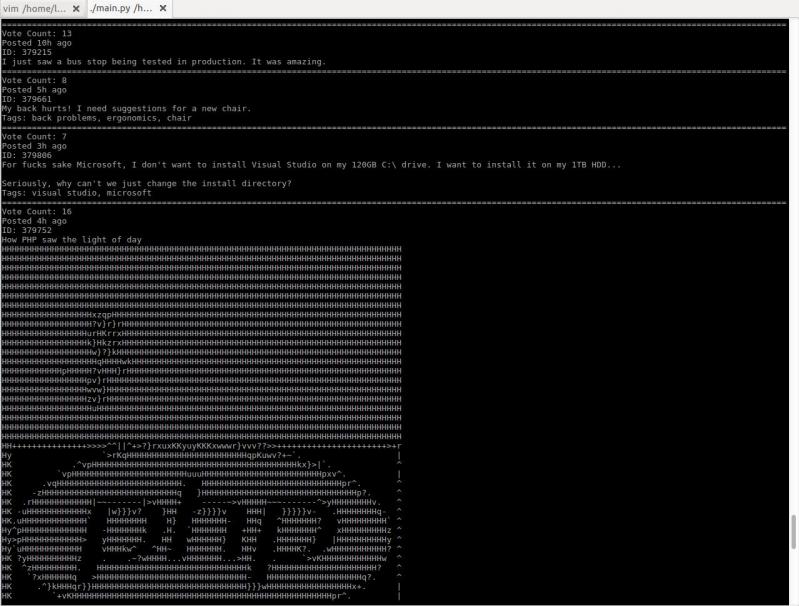Ranter
Join devRant
Do all the things like
++ or -- rants, post your own rants, comment on others' rants and build your customized dev avatar
Sign Up
Pipeless API

From the creators of devRant, Pipeless lets you power real-time personalized recommendations and activity feeds using a simple API
Learn More
Comments
-
 coolq47708y@jAsE
coolq47708y@jAsE
You know me 😊
Yeah, Python is so easy! The syntax is good because it just makes sense, good luck with your endeavours!
I hope to see this update in Python 4 😛 -
That's because python programs are usually small and writing small programs is easy. The syntax is definitely good, but don't think it's magic
-
 Cyanite83988y@JBSnorro
Cyanite83988y@JBSnorro
I don't think I've ever written a Python program with < 400 lines. My current project, Firecoder (ASCII/UTF-8 data encryptor) sits at 833 atm (including whitespace) -
Yeah I love Python's simple syntax!
Y = (lambda x: (lambda p: x(lambda a: p(p)(a))) ((lambda p: x(lambda a: p(p)(a)))))
A = lambda f: lambda x: (x*f(x-1) if x > 0 else 1)
B = lambda f: lambda n: 0 if n == 0 else (1 if n == 1 else f(n-1) + f(n-2))
[ Y(A)(x) for x in range(100) ]
[ Y(B)(x) for x in range(100) ]
It's so pleasing on the eyes... 🙃 -
@mundo03 Yeah just trolling. Although I would appreciate shorter & clearer lambda notation in Python.
-
 coolq47708yFirst off, we aren't exactly sure when we will be seeing python 4.
coolq47708yFirst off, we aren't exactly sure when we will be seeing python 4.
Some people think it will be at least a decade, others this it will be within two years, after Python 2 becomes officially outdated.
Also, we are not sure how Python will transition. It could be a snap or a gradual change.
Riding the bandwagon that Python 4 will be a big update, here is some speculation and ideas I have gathered over the years:
1). JIT as first class (confirmed in PEP-523)
2). Shortening Pythons startup time. Currently 3.7 takes around 3 times longer than 2.7
3). Stable first release. Python 3 shipped with numerous bugs, which were ironed out over time, but turns some people away
4). Static type hinting
5). Speed up named tuples.
6). More GPU utilisation for multiprocessing.
7). Refractoring CPythons API.
People are also hoping that with CPython now on GitHub that the community will start to contribute to Python as well. -
@coolq I think Python's version split has caused way too much damage in the past, so it would be good if they tried to do things differently, more gradual and roadmapped, with 4.
I also dislike the authoritarian "Great Leader Guido" atmosphere, which in my opinion is one of the reasons for the many spinoff interpreters.
They should focus on gradual feature upgrades with crystal clear roadmaps, a "council of experts" leadership with strong wider community involvement, and a priority on clean & simple parallelization syntax. -
 coolq47708y@bittersweet
coolq47708y@bittersweet
Ye, I agree.
I think while the authoritarian leadership approach worked at the start, there are so many features and requests to be added that they should really just involve the community. Also, it always feels like I'm a consumer watching development, it would be nice if I could contribute.
And yeah, version 3 caused a massive divide in the community. Tools became outdated faster, suddenly have to learn new syntax, millions of small changes..etc.
That said, it's always exciting when new features come out with a bang. But for the sake of the language, I think it would be better if it changes gradually.
Related Rants

 No questions asked
No questions asked As a Python user and the fucking unicode mess, this is sooooo mean!
As a Python user and the fucking unicode mess, this is sooooo mean! I just started working on a little project to browse devrant from terminal. It converts images to ascii art!
I just started working on a little project to browse devrant from terminal. It converts images to ascii art!
Python is so ridiculously easy and fast to write, I'm just waiting for the release where you just say:
def main():
make_program("RegExParser", "fast", "fancy")
And that's it...
rant
easy
mighty
python